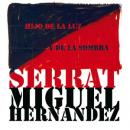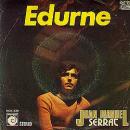Tot canvia, res canvia,
mira el tren, mira la via.
Si t'ho penses i bé observes,
ja sabràs filosofia.
Mil discursos, pocs recursos,
és el pa de cada dia.
Sols Espanya, qui ho diria,
vol ser sola i no canvia.
Monarquia, oligarquia,
dictadura, cara dura.
Barret frigi sens prestigi
i després vingué el prodigi.
Una guerra que ho esguerra
i un cabdill que adoptà un fill:
un jove de molta empenta
a qui li faltava un grill.
Hi ha feixistes i papistes,
i un grapat de llargues llistes,
rabassaires, mercenaris
i gents que resa rosaris.
Hi ha carlistes i marxistes,
i també alguns optimistes,
policies i espies,
i gent que no té manies.
I "la no intervención"
i "los del Real Perdón".
I segueix la llarga cursa,
que s'allarga i que s'escurça,
de corsaris i falsaris,
i visites a altres barris.
Els que passen la frontera
fent el salt de la pantera,
ben folrada la cartera,
foten "tiros" pel darrera.
Les rates de sagristia,
considerada gent pia,
i, ¡ai vés qui ho diria!,
fins i tots la meva tia.
I segueix la lletania
de l'amor, la mort i els dies.
mira el tren, mira la via.
Si t'ho penses i bé observes,
ja sabràs filosofia.
Mil discursos, pocs recursos,
és el pa de cada dia.
Sols Espanya, qui ho diria,
vol ser sola i no canvia.
Monarquia, oligarquia,
dictadura, cara dura.
Barret frigi sens prestigi
i després vingué el prodigi.
Una guerra que ho esguerra
i un cabdill que adoptà un fill:
un jove de molta empenta
a qui li faltava un grill.
Hi ha feixistes i papistes,
i un grapat de llargues llistes,
rabassaires, mercenaris
i gents que resa rosaris.
Hi ha carlistes i marxistes,
i també alguns optimistes,
policies i espies,
i gent que no té manies.
I "la no intervención"
i "los del Real Perdón".
I segueix la llarga cursa,
que s'allarga i que s'escurça,
de corsaris i falsaris,
i visites a altres barris.
Els que passen la frontera
fent el salt de la pantera,
ben folrada la cartera,
foten "tiros" pel darrera.
Les rates de sagristia,
considerada gent pia,
i, ¡ai vés qui ho diria!,
fins i tots la meva tia.
I segueix la lletania
de l'amor, la mort i els dies.
inviata da Alessandro - 2/11/2009 - 12:58
Lingua: Spagnolo
Traduzione spagnola dal blog di Gustavo Sierra Fernández
LETANÍA
Todo cambia, nada cambia.
Mira el tren, mira la vía.
Si lo piensas y bien observas,
ya sabrás filosofía.
Mil discursos, pocos recursos,
es el pan de cada día.
Solo España, quien lo diría,
quiere estar sola y no cambia.
Monarquía, oligarquía,
dictadura, caradura.
Gorro frigio sin prestigio
y después venga el prodigio.
Una guerra que lo estropea
y un caudillo que adopta un hijo:
un joven con mucho empuje
al que le faltaba un tornillo.
Hay fascistas y papistas,
y un puñado de largas listas,
propietarios, mercenarios
y gente que reza rosarios.
Hay carlistas y marxistas,
y también algunos optimistas,
policías y espías,
y gente que no tiene manías.
Y la "No intervención",
y los del Real Perdón.
Y sigue la larga curva,
que se alarga y que se acorta,
de corsarios y falsarios,
y visitas a otros barrios.
Los que pasan la frontera
haciendo el salto de la pantera,
bien forrada la cartera,
pegan tiros por detrás.
Las ratas de sacristía,
considerada gente pía,
y, ¡ay, ves quién los diría!,
está hasta mi tía.
Y sigue la letanía
del amor, la muerte y los días.
Todo cambia, nada cambia.
Mira el tren, mira la vía.
Si lo piensas y bien observas,
ya sabrás filosofía.
Mil discursos, pocos recursos,
es el pan de cada día.
Solo España, quien lo diría,
quiere estar sola y no cambia.
Monarquía, oligarquía,
dictadura, caradura.
Gorro frigio sin prestigio
y después venga el prodigio.
Una guerra que lo estropea
y un caudillo que adopta un hijo:
un joven con mucho empuje
al que le faltaba un tornillo.
Hay fascistas y papistas,
y un puñado de largas listas,
propietarios, mercenarios
y gente que reza rosarios.
Hay carlistas y marxistas,
y también algunos optimistas,
policías y espías,
y gente que no tiene manías.
Y la "No intervención",
y los del Real Perdón.
Y sigue la larga curva,
que se alarga y que se acorta,
de corsarios y falsarios,
y visitas a otros barrios.
Los que pasan la frontera
haciendo el salto de la pantera,
bien forrada la cartera,
pegan tiros por detrás.
Las ratas de sacristía,
considerada gente pía,
y, ¡ay, ves quién los diría!,
está hasta mi tía.
Y sigue la letanía
del amor, la muerte y los días.
inviata da Alessandro - 2/11/2009 - 13:04
Lingua: Inglese
English Version by Gustavo Sierra Fernandez
Probably it was at the beginnings of 60s when three members of the Setze Jutges (Cat. “Sixteen Judges”), Miquel Porter (singer and songwriter), Lluís Serrahima and Jaume Armengol (musician) wrote this curious and risky song: it’s a song that tells the recent Spanish history as it was a travel in train. However, the lyric was too clear, and therefore, too risky to even try record it (censorship never would allow it)… And the song stayed forgoten til 1996, when Joan Manuel Serrat recorded the soundtrack of D’un temps, d’un país (“Of a time, of a country”, title of a Raimon’s song, included on the LP): a record where the great Catalan songwriter makes covers of some of the most emblematic songs of the Nova Cançó Catalana (Cat. Catalan New Song): from the sobriety of Setze Jutges to the experiments of the movement Música Laietana, passing through the folksingers and folk groups. This is a lesson of History:
LITANY
Everything changes, nothing changes,
look at the train, look at the railway.
If you think about it and you watch well,
you shall know philosophy.
A thousand of speeches, little resources,
that’s our daily bread.
Only Spain, who would have thought,
wants to be alone and is not changing (1).
Monarchy, oligarchy,
dictatorship, cheeky,
Phrygian cap (2) without prestige
and later came the prodigy (3).
A war that spoil it,
a chieftain (4) that adopted a child:
a young man with a lot of spirit
who had a crew loose.
There are Fascists and Papists,
and a bunch of large lists,
landlords (5), mercenaries
and folks who say the rosary.
There are Carlists and Marxists,
and also some optimistists,
policemen and spies,
and people that has no shame.
And the “Non Intervention”
and those of the “Royal Pardon”.
And continues the large curve,
lenghtening and shortening,
of corsairs and forgers,
and visits to other neighbourhoods.
Those that cross the border
do the panther’s jump,
the wallet well covered,
*fuck the shooting behind*.
The sacristy rats,
considered as pious folks,
and, you see who would have thought!,
even my aunt.
And continues the litany
of the love, the death and the days.
Everything changes, nothing changes,
look at the train, look at the railway.
If you think about it and you watch well,
you shall know philosophy.
A thousand of speeches, little resources,
that’s our daily bread.
Only Spain, who would have thought,
wants to be alone and is not changing (1).
Monarchy, oligarchy,
dictatorship, cheeky,
Phrygian cap (2) without prestige
and later came the prodigy (3).
A war that spoil it,
a chieftain (4) that adopted a child:
a young man with a lot of spirit
who had a crew loose.
There are Fascists and Papists,
and a bunch of large lists,
landlords (5), mercenaries
and folks who say the rosary.
There are Carlists and Marxists,
and also some optimistists,
policemen and spies,
and people that has no shame.
And the “Non Intervention”
and those of the “Royal Pardon”.
And continues the large curve,
lenghtening and shortening,
of corsairs and forgers,
and visits to other neighbourhoods.
Those that cross the border
do the panther’s jump,
the wallet well covered,
*fuck the shooting behind*.
The sacristy rats,
considered as pious folks,
and, you see who would have thought!,
even my aunt.
And continues the litany
of the love, the death and the days.
(1) After the defeated of the Axis countries in the II World War, Franco’s was the only standing “allie” of Germany. During a time, Franco wished to be in peace with the winners, but in front of the threats of some democratic and socialist countries, and, in the other side, the demanding of a change into a more democratic regime, the dictator summoned to great shows of patriotism against foreigner intereferences, although at the same time, he made a little changes… Later, with the US president Eisenhower’s visit to Spain, the Francoist regime was, finally, recognized by the Nations Society.
(2) As in other countries, the Phrygian cap was the symbol of Republican and, also, Catalanists.
(3) These lines describes the last days of Alphons XIII’s reign, that, due to the national troubles, took place to the General Miguel Primo de Rivera’s dictatorship (1923-1930), and finally the advent of the II Spanish Republic.
(4) It’s not casual that the word used is cabdill, “caudillo” in Spanish: that was Franco’s sobriquet, equivalent to German Führer and Italian Duce.
(5) The Catalan landlords, cat. rabassaires, were opnely conservatives.
×
![]()







Sottotitolo: “Història ferroviària d'Espanya en unes quantes lliçons i alguns tut-tuus...”
Album “Banda sonora d'un temps d'un país” (1996)
Scritta da Miquel Porter, Lluís Serrahima e Jaume Armengol, tutti membri del collettivo “Els Setze Jutges”, fondato nel 1961 per rivendicare in chiave antifranchista la cultura e la lingua catalane.
Ovviamente la canzone all’epoca non potè essere incisa. La recuperò Serrat trent’anni più tardi.
Trovata sul blog di Gustavo Sierra Fernández